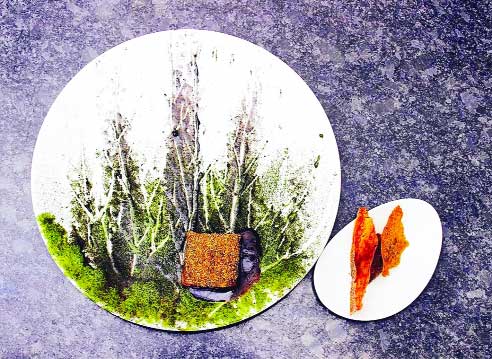Chef Priyam Chatterjee aspires to serve the Indian Prime Minister and the French President one day. He makes sure he takes the local vendors into account while curating his special menus or even blending Bengali cuisine with other European styles. By Team Viva
Like America, chefs could be India’s new rockstars too. And not a cliché this time. Serving food to the beat of a meticulously sourced soundtrack is a trend on the rise. And one such chef is Priyam Chatterjee who is also the first Indian chef to have been conferred with the honour of Chevalier de l’Ordre du Mérite Agricole. The honour comes in recognition of his contribution to reinventing the gastronomic scene in the Indian capital. Also a musician and an artist, Chatterjee has been recognised for his masterful plating and his eclectic cooking styles. His creative dishes draw upon his Bengali roots, the French influence in his life and his love for music and art.
As he reinvents the Bengali cuisine by blending it with French and European cuisine styles, he tell us why. “I figured out that the Bengali cuisine, being one of the most elegant and subtle, is also very underrated. The regional cuisine was dying. The younger generations do not want to eat what we have cherished and grown up with. But we can try to keep the cuisine very much alive if we gave it a fresh perspective and vision by keeping the taste authentic but changing its complete look,” says the chef, who feels that his training with the experts of French cuisine has helped him in achieving this. And this is why he could transform the “quintessential Bengali dishes” into what could be called the “modern” Bengali cuisine.
Sharing some anecdotes from his life, he talks about he shaped his food logic while growing up. Chatterjee calls himself fortunate and blessed to be born into a family of exceptional cooks and serious gourmands. And he has build his cuisine philosophy based on nostalgia, history and memories. “I am a Bengali and food is holy in my bloodline. My father was a very passionate man and I learnt procuring vegetables and fishes from him even though I have had very less time to spend with him,” he says and adds that his mother had brought her cooking heritage from Bangladesh and his aunts, too, were “cooking up a storm.”
However, Chatterjee owes the latter part of him becoming a professional cook completely to France, where he realised his “depth of passion” for the cuisine.
The chef, who has a cellular approach when it comes to sourcing his ingredients. He says, “I follow a very organic way. From visiting my suppliers and building a strong relationship with them to presenting my menu ideas with them and letting them decide what they have in store for me. I figure out what best can be made available in the season and then work on the menu.” He invites all his vendors once in two months and makes them eat what they cooked at the restaurant as “it’s important for me to make them realise what we do with all the amazing products that they source for me.”
It is commonly said that if a chef is not travelling, he is probably not experimenting. So how is it that he adapts his dishes to local ingredients while travelling? However, he says that while he is travelling, he only eats and tastes new dishes, making sure he emphasises on just that. “I try my level best to not eat fancy and only eat at traditional households where grand mothers are still cooking. I even try out street food or local joints thriving on history of their food culture. It opens up enormous doors of creativity and inspiration for me. I can then merge the subtleties with the blessing of complex and mega Indian spices and layers of aroma and flavours,” he adds.
Recalling one of his experiences in Ko Samui, Thailand, he says that their use of “absolutely” fresh produce and keeping it the way it is made the dishes super super tasty, which really impressed him. He is also a huge fan of South India, especially the “Andhra cuisine.” He says, “Their flavours are a gift to the world. I also find Gujarati cuisine one of the most delicate and complex ones to enjoy eating. It’s an art that shows how simple elements can be transformed into amazing food.”
For him, there is no particular cuisine in the world which perfectly balances sensory and nutritional elements. “I think every cuisine has its own balance. It’s not the cuisine that brings out the nutritional value but the product. Neo-Indian, Nordic and Neo-French cuisines are very ingredient-specific and minimalistic in their approach. But they are complex and packed with real flavours. Thus I thrive to cook those types of food with a little more oomph!” says he.
Talking about the honour he has received on behalf of the President of the French Republic by the Ambassador of France to India, Alexandre Ziegler, he tells us how he will initiate more such gastronomic practices and make contributions to the industry. He aspires to cook the country’s Prime Minister as well as the French President. “And strengthen the ties of the two unique cultures not just by diplomatic relationships but also through food and love. It will thus spread awareness and inspire other aspiring chefs to learn the craft religiously so that one day, even they could make their country proud and serve its leaders,” says the chef, who has been the head chef at Rooh (group of Indian chef Sujan Sarkar) and Qla in the city.


























